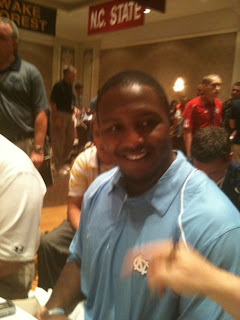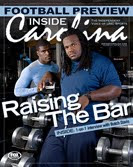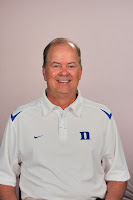The issue of athletes receiving improper benefits from sports agents has spread like a rash over the country, touching schools such at Georgia, Florida, Alabama, South Carolina and, of course, UNC.
While Tar Heel players were instructed not to discuss the situation involving Marvin Austin and Greg Little specifically today at the ACC Kickoff in Greensboro, UNC’s Robert Quinn did offer some insight into how agents and their runners, go about their business.
“They try to contact me on Facebook,” Quinn said. “But I don’t pay no attention to it. I don’t know how many, really. But that’s it. I ignore it.”
Due to his talents, Quinn is a big target for agents. If the 6-5 junior defensive end, who had 11 sacks last season, declares for the NFL after this season, he would be among the top five prospects overall, according to several scouting services. While it’s not illegal for athletes to have contact with agents, it is against NCAA rules and North Carolina law for them to receive anything of value or enter into an agreement before their eligibility is up.
N.C. State senior wide receiver Owen Spencer said agents do “a lot of things” to try to make contact with players. He said patience is the key to avoiding the trouble that’s always lurking.
“You try to stay away from all that,” Spencer said. “You just have to wait for it. You don’t want to jeopardize you eligibility. We just stay away from that.”
Miami defensive lineman Allen Bailey said he deals with online contact, via Facebook or Twitter, on a weekly basis.
“It can get to you if you allow it to,” Bailey said. “It’s annoying sometimes.”
Bailey said, like all major programs, compliance officials are adamant about educating athletes on the rules.
“Coach (Randy) Shannon, he harps on that real big,” Bailey said. “We have compliance meetings on that four times a year — on that topic specifically. We all know right from wrong. We know what we can and can’t do. I don’t think anybody would jeopardize their season or the whole team’s season because of that.”




